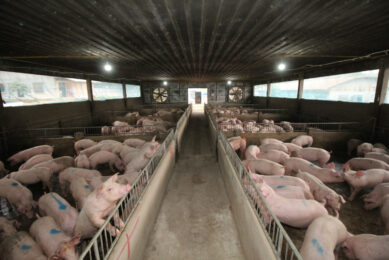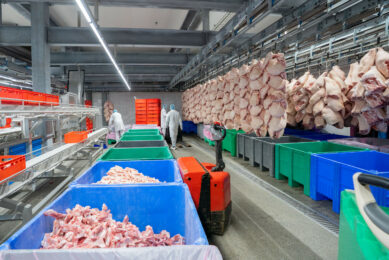ASF in China and Belgium: What is the latest?

As Belgium is slowly coming to terms with the fact that African Swine Fever is present in the country, additional outbreaks are reported in wild boar. In the meantime, China has reported ASF outbreaks in a new province: Inner Mongolia.
This weekend, Belgian media confirmed that the virus was found in 3 additional wild boar, all in the southern province of Luxembourg – again quite close to the borders with both the country Luxembourg as well as France. That would come on top of the initial ASF cases, found on Thursday. So far, no exact details have been supplied to the World Organization of Animal Health, hence they are not included in the map below.
Measures taken to cover ASF
At its website, the Belgian Farmers’ Union Boerenbond summarised the measures currently taken. As a result of the outbreaks, the Belgian authorities have created an ‘ASF zone’ around the outbreaks, which can be seen on the interactive map below. This zone will be closely monitored to clearly identify where the virus is located exactly. In this zone, hunting of wild boar has been forbidden, to make sure the animals stay put and will not flee to other areas.
Once the exact locations of infection are defined, the ASF zone will be divided into an ‘infected zone’ and a ‘buffer zone’. Inside the buffer zone, there will be attempts to reduce the wild boar population. These ‘zones’ will continue to exist for at least 24 months.
In addition, inside the ASF zone, measures apply for both wild boar as well as farmed pigs – although there are very few farmed swine in this region. No pigs can be transported and there is an increase of biosecurity. For every pig with clinical problems, a veterinarian needs to be consulted. All pigs need to be kept indoors.
Outside the ASF zone, farmers are being advised to maintain a high biosecurity protocol.

Read more on ASF in the Pig Progress Health Tool
Trade implications for Belgium
For trade, the ASF outbreaks in wild boar do have implications. Exports to countries outside the European Union are put on hold, to avoid recalls at a later stage. The Belgian Federal Agency for the Safety of the Food Chain will take this up with individual trading partners.
Exports to countries inside the EU have temporarily been put on hold, the Boerenbond informed. Major processors Vion and Tönnies have postponed the delivery of pigs, in anticipation of the measures that will be taken by the Belgian authorities to combat ASF. It is expected that this ban will be lifted fairly soon again.
African Swine Fever in China
In the meantime, China has resumed reporting a few cases of African Swine Fever outbreaks. Last week Friday as well as this Monday, outbreaks from a new province were mentioned: Inner Mongolia. The Friday outbreak was confirmed by the OIE as well.

20 reasons why Asia should fear ASF
The outbreak on Friday occurred on a farm with 237 animals, of which 16 died. This Monday’s outbreak allegedly found 8 animals dead, and 14 infected on a farm of 159 animals.
China also reported a 2nd outbreak in central Henan province, which was confirmed by the OIE. So far only a slaughterhouse had been found infected there. In this province, a farm of 2,087 pigs was struck, on which 148 animals got infected and 64 had died.
ASF count at the OIE
As a result of the new outbreaks in Inner Mongolia, also in the neighbouring provinces of Ningxia and Gansu, a transport ban for pigs and pork has been put in place. This is all reflected in the updated ASF map of China below. The count stands on 22 outbreaks in 7 provinces.











